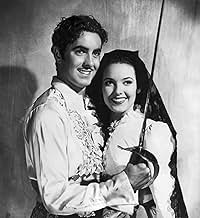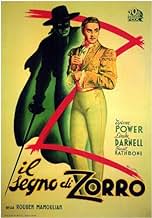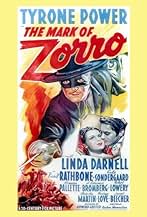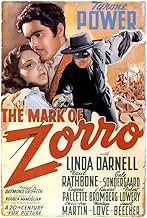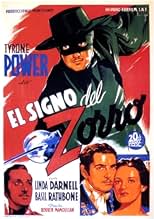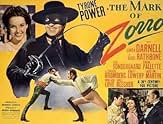IMDb-BEWERTUNG
7,5/10
11.594
IHRE BEWERTUNG
Füge eine Handlung in deiner Sprache hinzuA young Spanish aristocrat must masquerade as a fop in order to maintain his secret identity of Zorro as he restores justice to early California.A young Spanish aristocrat must masquerade as a fop in order to maintain his secret identity of Zorro as he restores justice to early California.A young Spanish aristocrat must masquerade as a fop in order to maintain his secret identity of Zorro as he restores justice to early California.
- Für 1 Oscar nominiert
- 4 Gewinne & 1 Nominierung insgesamt
Ed Agresti
- Caballero
- (Nicht genannt)
Empfohlene Bewertungen
This is what I can't help but like about the old high seas adventures and swashbuckling romances of the 1930s and '40s. You know, the ones where you can always hear Alfred Newman's bombastic score. The Mask of Zorro opens with a title card saying, "Madrid - when the Spanish Empire encompassed the globe, and young blades were taught the fine and fashionable art of killing
" So what's that, like 18...30? 1840? I guess we'll figure it out. And so we do, of course. But there was an unabashed syrupy-ness about the melodramatic urgency given to these movies.
When Zorro's not prancing around in his little cape eye-mask, he's playing the part of the utterly timid, and more than a touch effeminate, Don Diego Vega. The likelihood that Vega could be the remarkably expert swashbuckler never once dawns on the baddies, largely because Vega is such a stern little prude.
The first big-budget talkie starring the swashbuckling samaritan, Rouben Mamoulian's old-fashioned jaunt was a blockbuster in 1940, and it remains recalled quite warmheartedly by the Silent Generation's moviegoers, and equally the small screen's fascinated beginners among the Baby Boom, as one of the period's very best adventure pictures. One grows accustomed to the movie's qualitative foothold in that time of matinée idols and sword-fighting silver-screen hero worship, and we can concede for that reason. But tolerant filmgoers will stay open for a movie that's considerably chock-a-block with romance, action, duplicity, and courageous bravado, all in an overstated manner that could've only been taken seriously in 1940, and perhaps not one year later.
The nuts and bolts are all here: Don Diego is invited to come home from Madrid to his family in Los Angeles, but upon his reappearance he learns that his father's standing as "alcalde" has been seized by the shameless Don Luis Quintero, a nasty piece of work who's nothing more than a minion to the man enjoying the real supremacy: Captain Esteban Pasquale. As expected, Diego/Zorro means to linger in Los Angeles just long enough to depose the scoundrels, entice a pretty slice of illicit fruit, and bring integrity to his family's native soil. Nothing ground-breaking here, but there's nothing amiss in a straightforward adventure yarn told in the traditional way.
When Zorro's not prancing around in his little cape eye-mask, he's playing the part of the utterly timid, and more than a touch effeminate, Don Diego Vega. The likelihood that Vega could be the remarkably expert swashbuckler never once dawns on the baddies, largely because Vega is such a stern little prude.
The first big-budget talkie starring the swashbuckling samaritan, Rouben Mamoulian's old-fashioned jaunt was a blockbuster in 1940, and it remains recalled quite warmheartedly by the Silent Generation's moviegoers, and equally the small screen's fascinated beginners among the Baby Boom, as one of the period's very best adventure pictures. One grows accustomed to the movie's qualitative foothold in that time of matinée idols and sword-fighting silver-screen hero worship, and we can concede for that reason. But tolerant filmgoers will stay open for a movie that's considerably chock-a-block with romance, action, duplicity, and courageous bravado, all in an overstated manner that could've only been taken seriously in 1940, and perhaps not one year later.
The nuts and bolts are all here: Don Diego is invited to come home from Madrid to his family in Los Angeles, but upon his reappearance he learns that his father's standing as "alcalde" has been seized by the shameless Don Luis Quintero, a nasty piece of work who's nothing more than a minion to the man enjoying the real supremacy: Captain Esteban Pasquale. As expected, Diego/Zorro means to linger in Los Angeles just long enough to depose the scoundrels, entice a pretty slice of illicit fruit, and bring integrity to his family's native soil. Nothing ground-breaking here, but there's nothing amiss in a straightforward adventure yarn told in the traditional way.
Great action and at the same time one of the most hilarious roles ever to come out of Hollywood. Tyrone Power is great in the title role, not only when in full swashbuckling action as Zorro, but also as the effeminate dandy Don Diego Vega, fanning his handkerchief, sneezing, and performing ridiculous magic tricks upon stupid prison wardens, when not courting the beautiful Alcalde's daughter Inez Quintero. You gotta love Zorro, the good old-fashioned hero of LA county, always prepared to fight for justice, fight poverty and save damsels in distress, occasionally engraving the mark "Z", preferably on men's chest or cloth.
There's enough innuendo and snappy dialog in here to keep adult audiences entertained as well as enough action for younger audiences to cherish this film (and even enough romance with dashing Power to keep the ladies satisfied). Basil Rathbone, as Captain Esteban Pasquale, makes a superb villain, always prepared to draw his sword, either for serious business or sadistic amusement. "Most men have objects they play with. Churchmen have their beads; I toy with a sword."
Wit Tyrone Power's undisputed comedic talent, he adds so much wit into his character (and to the already hilarious lines), the film is a real hoot. It's a shame Power embarked on more serious roles later in his career. With most of the lines ranging from the outright hilarious to marvelously corny, like Don Diego Vega's courting of the young lady Inez: "You're more lovely, more radiant than a morning in June," it's hard to take it all very serious, but when the fencing starts, playtime is over. Basil Rathbone, one of Hollywood's most skilled swordsmen, knows how to handle a sword like no-one else and Tyrone Power was quick to learn. The climactic swashbuckling scene between the two arch enemies in the small confined room of the Alcalde (brilliantly choreographed) is - till this very day - the best sword fight ever put on film, even surpassing the final fight between Rathbone and Errol Flynn, two years before in THE ADVENTURES OF ROBIN HOOD (1938).
Camera Obscura --- 9/10
There's enough innuendo and snappy dialog in here to keep adult audiences entertained as well as enough action for younger audiences to cherish this film (and even enough romance with dashing Power to keep the ladies satisfied). Basil Rathbone, as Captain Esteban Pasquale, makes a superb villain, always prepared to draw his sword, either for serious business or sadistic amusement. "Most men have objects they play with. Churchmen have their beads; I toy with a sword."
Wit Tyrone Power's undisputed comedic talent, he adds so much wit into his character (and to the already hilarious lines), the film is a real hoot. It's a shame Power embarked on more serious roles later in his career. With most of the lines ranging from the outright hilarious to marvelously corny, like Don Diego Vega's courting of the young lady Inez: "You're more lovely, more radiant than a morning in June," it's hard to take it all very serious, but when the fencing starts, playtime is over. Basil Rathbone, one of Hollywood's most skilled swordsmen, knows how to handle a sword like no-one else and Tyrone Power was quick to learn. The climactic swashbuckling scene between the two arch enemies in the small confined room of the Alcalde (brilliantly choreographed) is - till this very day - the best sword fight ever put on film, even surpassing the final fight between Rathbone and Errol Flynn, two years before in THE ADVENTURES OF ROBIN HOOD (1938).
Camera Obscura --- 9/10
Tyrone Power - the swashbuckling answer to Errol Flynn - is cast as the agile masked avenger who decides to take up the people's cause in disguise leaving his 'mark' "Z" everywhere, on walls, coach, wooden barrels and human chest...
Power - in a double leading role - is at his best as Zorro, climbing, jumping, riding and fencing, determined to finish with tyranny and oppression by terrorizing, and retrieving taxation funds and by challenging a cunning officer, proving in public his indifference, his ostentation and irony as a perfect pacifist fop in 19th-Century Spanish California, confusing and deceiving his aristocratic father Don Alejandro Vega (Montagu Love), the deposed Alcalde...
The inspired casting (in supporting roles) recalls "The Adventures of Robin Hood."
Linda Darnell is the pretty Lolita, Quintero's charming niece, who loves the mysterious hero and can't tolerate the fop until she is told that they are the image of the same person...
Basil Rathbone, one of the most durable of screen villains who has mastered stage fencing but never won a Swordfight, plays the cruel captain Esteban Pasquale, the Alcalde's military adviser... He is a second-rate soldier of fortune who leads the campaign of frustrating taxation, who considered Diego "a fancy clown" but who suggests a practical plan, an alliance for the good of the state...
J. Edward Bromberg is the cowardly Alcalde, Don Luis Quintero, a corrupted thief, enemy of the people, whose tyranny and avarice are always enforced by the treachery of his iron hand, the rigorous captain Esteban...
Eugene Palette plays the mission 'fat' priest (Father Felipe) who ignores that Diego is the opposing force...
The high point of the picture is the fantastic duel between Power and Rathbone, a masterpiece of screen Swordplay...
Rouben Mamoulian succeeds in making two great stars dance to an unheard music... With a touch of a great filmmaker, Mamoulian mixes harmoniously movement and action, decor and lightning with rage and turmoil, heroism and romance...
Under Alfred Newman's Oscar-Nominated score and despite the unusual absence of Technicolor, the film (the first of the great Tyrone Power swashbucklers ) is great fun, full of vitality and suspense, an exciting, deliciously ironic swashbuckler...
Power - in a double leading role - is at his best as Zorro, climbing, jumping, riding and fencing, determined to finish with tyranny and oppression by terrorizing, and retrieving taxation funds and by challenging a cunning officer, proving in public his indifference, his ostentation and irony as a perfect pacifist fop in 19th-Century Spanish California, confusing and deceiving his aristocratic father Don Alejandro Vega (Montagu Love), the deposed Alcalde...
The inspired casting (in supporting roles) recalls "The Adventures of Robin Hood."
Linda Darnell is the pretty Lolita, Quintero's charming niece, who loves the mysterious hero and can't tolerate the fop until she is told that they are the image of the same person...
Basil Rathbone, one of the most durable of screen villains who has mastered stage fencing but never won a Swordfight, plays the cruel captain Esteban Pasquale, the Alcalde's military adviser... He is a second-rate soldier of fortune who leads the campaign of frustrating taxation, who considered Diego "a fancy clown" but who suggests a practical plan, an alliance for the good of the state...
J. Edward Bromberg is the cowardly Alcalde, Don Luis Quintero, a corrupted thief, enemy of the people, whose tyranny and avarice are always enforced by the treachery of his iron hand, the rigorous captain Esteban...
Eugene Palette plays the mission 'fat' priest (Father Felipe) who ignores that Diego is the opposing force...
The high point of the picture is the fantastic duel between Power and Rathbone, a masterpiece of screen Swordplay...
Rouben Mamoulian succeeds in making two great stars dance to an unheard music... With a touch of a great filmmaker, Mamoulian mixes harmoniously movement and action, decor and lightning with rage and turmoil, heroism and romance...
Under Alfred Newman's Oscar-Nominated score and despite the unusual absence of Technicolor, the film (the first of the great Tyrone Power swashbucklers ) is great fun, full of vitality and suspense, an exciting, deliciously ironic swashbuckler...
There is a curious parallel between Tyrone Power's life and career, and that of WB swashbuckler, Errol Flynn. Both of Irish descent, the two actors exploded into superstar status in their twenties, due to a single starring role in films made within a year of each other (for Flynn, barely 26, it was in 1935's CAPTAIN BLOOD; Power's breakthrough, at 22, came in 1936's LLOYDS OF LONDON). Both actors were extraordinarily handsome, were great practical jokers both on and off-screen, fought continuously with their respective studios for better roles, married three times (Flynn fathered three daughters and a son; Power, two daughters and a son), lived wildly adventurous lives, becoming infamous for their sexual indiscretions, and would die, less than a year apart, within two years of making their only film together (1957's THE SUN ALSO RISES). However, while Flynn had a reputation as a charismatic hell raiser which would make him as many enemies as friends during his tempestuous life, Tyrone Power was, by all accounts, even more charming and likable in person than he was on screen, and was universally loved, even by his ex-wives.
Both stars were considered premier swashbucklers of their time, and 1940's THE MARK OF ZORRO introduced Power to the genre dominated by Flynn. Just as Flynn's greatest triumph was a remake of an earlier Douglas Fairbanks classic (1922's ROBIN HOOD), Power's best-loved swashbuckler had first been a Fairbanks favorite, as well (1920's THE MARK OF ZORRO). As Don Diego de Vega, a cadet at 'the Academy' in Madrid who puts his gift with the sword to good use in an oppressed California, when recalled home by his father, he quickly adopts an effeminate persona (a la THE SCARLET PIMPERNEL), to mask his true ability and plans. While the charade infuriates his father ("My son has become a PUPPY!" he laments, at a time when the word 'homosexual' was not used), the guise helps the younger Vega worm his way into the confidence of the corrupt yet cowardly current Alcalde (the venerable J. Edward Bromberg) and his socially-conscious wife (Gale Sondergaard). Less 'taken in' is the true villain of the film, military commander Captain Esteban Pasquale (superbly portrayed by frequent Flynn nemesis Basil Rathbone), who sneers at the Alcalde's plan to marry Vega off to his niece, Lolita (the ravishing Linda Darnell), to quell local unrest; when Vega claims tardiness for the engagement dinner because of his bath water becoming 'tepid', Pasquale comments, "Just as I fear poor Lolita's future married life shall be."
The on-screen chemistry between Power and Darnell is terrific (a key scene, with Vega/Zorro disguised as a priest, as Lolita confesses her secret desires, would be 'spiced up' and recreated in the Banderas/Zeta-Jones 1998 update, THE MASK OF ZORRO). As the only other person who knows Zorro's real identity, Fray Felipe (Eugene Pallette, playing a role very similar to his 'Friar Tuck' in Flynn's ROBIN HOOD) has some of the film's wittiest dialog, and gets to show his swordsmanship in a brief duel with Pasquale ("You should have been a soldier", the captain comments, after disarming him).
If the film has a fault, it is that the Power/Rathbone climactic duel occurs too early. Staged by Errol Flynn's fencing master, Fred Cavens, the action is spectacular, confined to a single room, yet with Pasquale's death, the film loses it's most potent villain, and the final large-scale fight between the Alcalde's forces and the peons and gentry lacks the focus of the climax of THE ADVENTURES OF ROBIN HOOD.
Directed with tongue-in-cheek by veteran film maker Rouben Mamoulian, and with an Oscar-nominated score by Fox's musical mainstay, Alfred Newman, THE MARK OF ZORRO was a major studio hit (plans for a sequel were begun, but dropped when it was discovered that Fox only had the rights to the title, THE MARK OF ZORRO; the name 'Zorro' belonged to another studio, ending any possibility of a follow-up).
Tyrone Power had joined Errol Flynn as the reigning 'kings' of swashbucklers, a title both would find amusing, if limiting, but which would be how both actors are best remembered, today!
Both stars were considered premier swashbucklers of their time, and 1940's THE MARK OF ZORRO introduced Power to the genre dominated by Flynn. Just as Flynn's greatest triumph was a remake of an earlier Douglas Fairbanks classic (1922's ROBIN HOOD), Power's best-loved swashbuckler had first been a Fairbanks favorite, as well (1920's THE MARK OF ZORRO). As Don Diego de Vega, a cadet at 'the Academy' in Madrid who puts his gift with the sword to good use in an oppressed California, when recalled home by his father, he quickly adopts an effeminate persona (a la THE SCARLET PIMPERNEL), to mask his true ability and plans. While the charade infuriates his father ("My son has become a PUPPY!" he laments, at a time when the word 'homosexual' was not used), the guise helps the younger Vega worm his way into the confidence of the corrupt yet cowardly current Alcalde (the venerable J. Edward Bromberg) and his socially-conscious wife (Gale Sondergaard). Less 'taken in' is the true villain of the film, military commander Captain Esteban Pasquale (superbly portrayed by frequent Flynn nemesis Basil Rathbone), who sneers at the Alcalde's plan to marry Vega off to his niece, Lolita (the ravishing Linda Darnell), to quell local unrest; when Vega claims tardiness for the engagement dinner because of his bath water becoming 'tepid', Pasquale comments, "Just as I fear poor Lolita's future married life shall be."
The on-screen chemistry between Power and Darnell is terrific (a key scene, with Vega/Zorro disguised as a priest, as Lolita confesses her secret desires, would be 'spiced up' and recreated in the Banderas/Zeta-Jones 1998 update, THE MASK OF ZORRO). As the only other person who knows Zorro's real identity, Fray Felipe (Eugene Pallette, playing a role very similar to his 'Friar Tuck' in Flynn's ROBIN HOOD) has some of the film's wittiest dialog, and gets to show his swordsmanship in a brief duel with Pasquale ("You should have been a soldier", the captain comments, after disarming him).
If the film has a fault, it is that the Power/Rathbone climactic duel occurs too early. Staged by Errol Flynn's fencing master, Fred Cavens, the action is spectacular, confined to a single room, yet with Pasquale's death, the film loses it's most potent villain, and the final large-scale fight between the Alcalde's forces and the peons and gentry lacks the focus of the climax of THE ADVENTURES OF ROBIN HOOD.
Directed with tongue-in-cheek by veteran film maker Rouben Mamoulian, and with an Oscar-nominated score by Fox's musical mainstay, Alfred Newman, THE MARK OF ZORRO was a major studio hit (plans for a sequel were begun, but dropped when it was discovered that Fox only had the rights to the title, THE MARK OF ZORRO; the name 'Zorro' belonged to another studio, ending any possibility of a follow-up).
Tyrone Power had joined Errol Flynn as the reigning 'kings' of swashbucklers, a title both would find amusing, if limiting, but which would be how both actors are best remembered, today!
This movie was directed by Rouben Mamoulian and this was basically the only action movie he directed and probably his best film, he made one more movie with Tyrone Power a year later called Blood And Sand and that was pretty bad. This is also one of Power's best movies and much better than Jesse James the year before. Their isn't much to the plot that you need to know like Power coming back from Spain and finding his father thrown out of power by a dictator and the people are starving. His father can't or won't do anything so Power decides to become Zorro. Basil Rathbone is the dictator's top bodyguard and a top swordsman. Linda Darnell is the dictator's daughter who winds up getting married to Power through an arranged marriage. This is much better then the remake in 98 called The Mask Of Zorro and a great movie.
Wusstest du schon
- WissenswertesThe famous duel was staged by Hollywood fencing master Fred Cavens. He specialized in staging duels that relied more on real swordplay rather than the jumping on furniture and leaping from balconies that many film duels incorporated up until that point. Cavens' son, Albert Cavens, doubled for Tyrone Power in the fancier parts of the duel (mostly with his back to camera), such as the extended exchange with Esteban ending with Don Diego's sword smashing into the bookcase. Basil Rathbone, a champion fencer in real life, did not care for the saber (the weapon of choice in this film), but nevertheless did all of his own fencing. Fast fencing shots were under-cranked to 18 or 20 frames per second (as opposed to the standard 24fps) and all the sound effects were post-synchronized.
- PatzerThe character "Captain Esteban Pasquale" uses the Italian spelling for his surname. The Spanish spelling is Pascual. While a subsequent addition to this entry has sought to attribute it to the presence of Italian mercenaries in the Spanish army of the period, the inescapable fact is that the screenwriter had more important things to attend to than inject such a trivial historical footnote. He misspelled Pascual's name in the script (made obvious by Basil Rathbone's pronouncing it in the two-syllable Spanish form, pas-KWAL), and that misspelling was then incorporated in the copy provided the department that drew up the film's end title.
- Zitate
Captain Esteban Pasquale: His Excellency will never forgive me if I let you go without a word of welcome from him. I'm quite sure that you'll save me a reprimand.
Don Diego Vega: How could I refuse a man anything with a naked sword in his hand?
- Crazy CreditsOpening credits prologue: MADRID - when the Spanish Empire encompassed the globe, and young blades were taught the fine and fashionable art of killing ...
- Alternative VersionenAlso available in a colorized version.
- VerbindungenEdited into Myra Breckinridge - Mann oder Frau? (1970)
Top-Auswahl
Melde dich zum Bewerten an und greife auf die Watchlist für personalisierte Empfehlungen zu.
- How long is The Mark of Zorro?Powered by Alexa
- What is 'The Mark of Zorro' about?
- Is 'The Mark of Zorro' based on a book?
- Was Zorro a real person?
Details
- Erscheinungsdatum
- Herkunftsland
- Sprachen
- Auch bekannt als
- La marca del Zorro
- Drehorte
- Produktionsfirma
- Weitere beteiligte Unternehmen bei IMDbPro anzeigen
Box Office
- Budget
- 1.000.000 $ (geschätzt)
- Weltweiter Bruttoertrag
- 10.248 $
- Laufzeit1 Stunde 34 Minuten
- Farbe
- Seitenverhältnis
- 1.37 : 1
Zu dieser Seite beitragen
Bearbeitung vorschlagen oder fehlenden Inhalt hinzufügen


